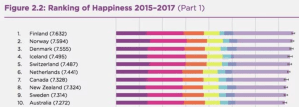Have you noticed a pattern in your productivity through a working day? In more cases than not, the last one or two hours at work are almost always the hardest. We get in at 9am, work on daily tasks productively for about 5 hours (with a lunch break), and usually find it a challenge to remain focused as the evening nears. There are a few countries around the world that acknowledge the diminishing productivity of employees as the day goes by and have implemented lower working hours in an effort to increase satisfaction and maintain high energy.
Before we get into how the UAE might benefit from lower working hours, let’s look at the countries where this is already established. Netherlands for example, has an average of 27.5 hours per week. Spread across 5 days, thats 5 and a half hours. The country enjoys low levels of unemployment and high income. The government incentivizes part time jobs and emphasizes personal growth as well. Germany has a very similar set of working hours. The average hours worked per week is 27.75 which is about 5.55 hours per day. Norway is right behind with an average of 5.6 hours per week. It is also worth mentioning that they rank 3rd in the top 10 happiest countries in the world. Denmark, which also consistently ranks in the top 3 happiest countries, has work days averaging to about 5.64 hours.

Given the UAE’s mission to place in the top 10 happiest countries in the world by 2021, the government might consider lowering working hours and allowing employees more time for self-development and personal growth. This would increase overall satisfaction and might even make for more productive work days. It would definitely be a trial and error process, but might be a long term initiative worth considering. Granted, the opportunity cost of reducing working hours might lead to lower sales. However, since hourly pay is a variable cost, companies might realize an increase in profitability. Companies might also be able to allocate more hours to higher performing employees and less hours to employees with lower utility. The downside is that those select employees might have lower satisfaction due to lack of pay, which might lead to less productivity and sales.

All of this is relatively speculative and the only way to truly analyze the cost-benefit would be if the UAE government decided to experiment with the idea. The upsides are clear, and would likely help the overall happiness index of the country as a whole. The potential downsides mentioned above are only a theory, yet may prove true.
Check out Bayzat’s health insurance policies: https://www.bayzat.com/medical-insurance








Get Social